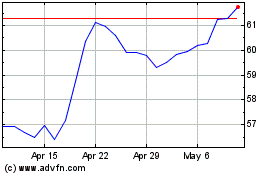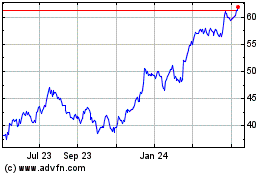Despite Fiduciary Uncertainty, Wells Fargo Details Compliance Plans -- Update
December 01 2016 - 4:48PM
Dow Jones News
By Michael Wursthorn
Wells Fargo & Co. will continue to allow retirement savers
who work with its brokerage arm to pay commissions for trades, as
Wall Street brokerages move ahead with plans to comply with new
conflict-of-interest rules on retirement accounts despite
uncertainty surrounding their fate.
The Labor Department's so-called fiduciary rule, which is set to
take effect in April, aims to eliminate conflicts from retirement
advice and requires brokers to act in the best interests of their
clients. The rule's fate has become unclear as Republicans in
Congress and the incoming Trump administration have made it clear
that Obama-era regulations are under review for repeal or
replacement.
The San Francisco bank said that while it is planning for a
variety of different scenarios surrounding the fate of the rule, it
is preparing as if the rule will be implemented in April as
scheduled. "While there is a great deal of speculation in the media
on how the election results will affect the DOL rule, none of us
can say with certainty what will actually happen," Wells Fargo said
in a memorandum, reviewed by The Wall Street Journal, to its more
than 15,000 brokers on Thursday.
Wells Fargo's brokerage arm, Wells Fargo Advisors, which has
more $1.5 trillion in total client assets, said it would allow its
brokers to continue offering individual retirement accounts that
charge investors per-transaction commissions, an approach toward
compliance similar to some brokerages such as Morgan Stanley and
Edward Jones.
However, Wells clients in those accounts after April will likely
have a slimmer menu of investment products to choose from, people
with knowledge of the matter said, although details weren't
immediately available.
Firms still offering commission-based IRAs have had to drop some
investment products from them to comply with some restrictions
within the rule. Edward Jones, for example, won't allow retirement
savers who pay a commission to buy mutual funds next year, while
some alternative investments won't be immediately available in
commission-based IRAs at Morgan Stanley.
The approach to allow commission offerings differs from rivals
Bank of America Corp.'s Merrill Lynch and J.P. Morgan Chase &
Co., among others. Merrill and J.P. Morgan said in recent months
that they would ditch the industry's traditional commission-based
sales model for retirement accounts and will effectively offer only
IRAs that charge a fee based on a percentage of assets starting
next year.
The retirement rules -- which researcher Morningstar Inc.
predicts will affect about $3 trillion of commission-based
retirement assets in the U.S. -- bring a host of changes, including
how investors pay for retirement advice, the elimination of
compensation incentives for brokers and higher investment
minimums.
But since Republicans took the White House and retained control
of Congress, firms now face the dizzying possibility of an outright
dismantling of the rule.
Congressional Republicans opposing the rule have seized on
Donald Trump's surprise presidential win as a chance to stop the
regulations ahead of their implementation. Rep. Jeb Hensarling, the
Texas Republican who heads the House Financial Services Committee,
and Rep. Ann Wagner (R., Mo.), who has been one of the most vocal
opponents of the rule, have both said their party will renew the
fight to halt it next year.
Republicans challenging the rule have said it would cut small
retirement savers off from affordable financial advice. A recent
survey by analytics firm CoreData Research of 552 financial
advisers in the U.S. found that 71% plan to no longer service some
smaller investors because of the rule.
Wells Fargo and other brokerages are moving ahead with
implementation despite the uncertainty. But even if the rule is
shelved, certain aspects of it, such as heightened oversight of
retirement accounts, will continue to move forward at Wells Fargo,
people familiar with the matter said.
For investors, the rule's halt may not be that apparent if firms
choose to keep some of the changes they've already made or planned.
Some companies will be able to implement the rule's higher standard
of care without the costly compliance requirements, said Kent
Mason, a partner at law firm Davis & Harman LLP who focuses on
retirement.
"But people may have also lost the option of choice," Mr. Mason
added, referring to some firms' decision to no longer offer
commission-based IRAs. "The legacy of the rule may be less access
[for small savers] and less choice."
Write to Michael Wursthorn at Michael.Wursthorn@wsj.com
(END) Dow Jones Newswires
December 01, 2016 16:33 ET (21:33 GMT)
Copyright (c) 2016 Dow Jones & Company, Inc.
Wells Fargo (NYSE:WFC)
Historical Stock Chart
From Mar 2024 to Apr 2024

Wells Fargo (NYSE:WFC)
Historical Stock Chart
From Apr 2023 to Apr 2024
